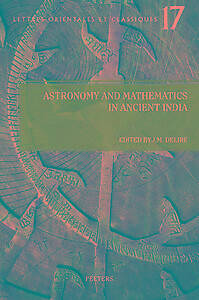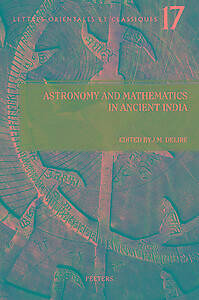
- Afhalen na 1 uur in een winkel met voorraad
- Gratis thuislevering in België vanaf € 30
- Ruim aanbod met 7 miljoen producten
- Afhalen na 1 uur in een winkel met voorraad
- Gratis thuislevering in België vanaf € 30
- Ruim aanbod met 7 miljoen producten
Zoeken
Astronomy and Mathematics in Ancient India - Astronomie Et Mathematiques de l'Inde Ancienne
€ 38,00
+ 76 punten
Omschrijving
Already in 1786, Sir William Jones, founder of the Asiatick Society in Calcutta, wrote What their astronomical and mathematical writings contain, will not, I trust, remain long a secret: they are easily procured, and their importance cannot be doubted. Nevertheless, though India is nowadays a part of our daily media environment, its science, as ancient as Greek science, is still badly known and insufficiently included in history of science manuals. This book aims at helping to fill this gap by letting some of the best specialists in Indian astronomy and mathematics express themselves. They recount the evolution of these sciences, from the Aryabhatiya (6th century) to the works of the Keralese astronomers-mathematicians (13th-14th centuries), via treatises on prosody (14th century) and on astrolabe making produced since the same period. These treatises are described in association with the oldest Sanskrit astrolabe, preserved in Belgium. En 1786 dej..., Sir William Jones, fondateur de l'Asiatick Society ... Calcutta, ecrivait Pour leurs ecrits astonomiques et mathematiques, je suis sur que leur contenu ne restera pas longtemps un secret: ils sont aisement disponibles, et leur importance ne fait aucun doute. Et pourtant, alors que l'Inde fait aujourd'hui partie de notre environnement mediatique quotidien, sa science, qui est au moins aussi ancienne que la science grecque, est toujours mal connue et trop peu integree dans les ouvrages d'histoire des sciences. Ce livre veut contribuer ... combler cette lacune en donnant la parole ... certains des meilleurs specialistes de l'astronomie et des mathematiques indiennes. Ceux-ci retracent l'evolution de ces sciences, depuis l'Aryabhatiya (VIe siecle) jusqu'aux travaux des astronomes mathematiciens keralais (XIII-XVIe siecles), en passant par des traites de prosodie (XIVe siecle) et de fabrication d'astrolabes composes depuis la meme epoque. Ces derniers traites sont decrits en association avec le plus ancien astrolabe sanskrit, conserve en Belgique.
Specificaties
Betrokkenen
- Uitgeverij:
Inhoud
- Aantal bladzijden:
- 199
- Taal:
- Engels
- Reeks:
- Reeksnummer:
- nr. 17
Eigenschappen
- Productcode (EAN):
- 9789042926141
- Verschijningsdatum:
- 18/09/2012
- Uitvoering:
- Paperback
- Formaat:
- Trade paperback (VS)
- Afmetingen:
- 160 mm x 239 mm
- Gewicht:
- 399 g

Alleen bij Standaard Boekhandel
+ 76 punten op je klantenkaart van Standaard Boekhandel
Beoordelingen
We publiceren alleen reviews die voldoen aan de voorwaarden voor reviews. Bekijk onze voorwaarden voor reviews.










